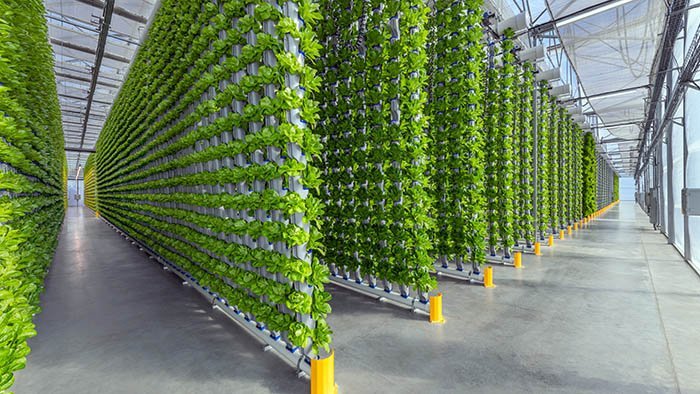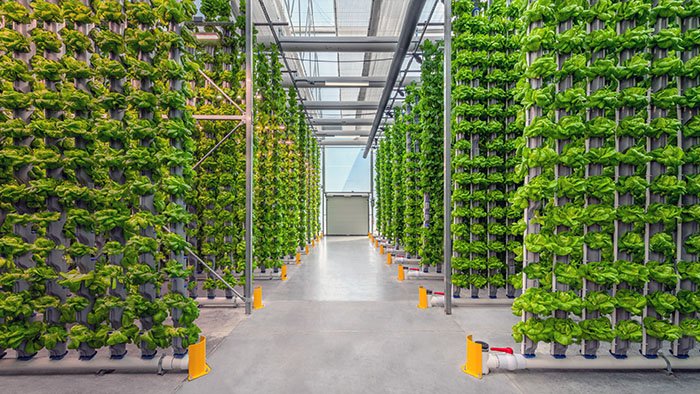Revolutionizing Blockchain Agriculture: A Sustainable Future with Eden Green
You may have heard the phrase “blockchain agriculture” and wondered what it meant. In essence, it’s a way of using blockchain technology within the agricultural supply chain. This has become essential with the rising demand for transparency in the agricultural supply chain.
Today, many people are becoming more interested in the source of their food. This is frequently related to food safety, sustainability, a desire to support the local economy, animal welfare, or workers’ rights. In the event of a food recall, the ability to trace the source of various food items means we can more quickly determine where a problem started and ensure it is contained. Blockchain technology offers an unprecedented ability to trace where and how your food was produced.
Eden Green Technology is strongly committed to leveraging blockchain for a sustainable and transparent future. We want to ensure that our consumers can easily understand where each product came from and how it was produced. Let’s further explore this fascinating advancement and how it could impact our food choices in the future.
The Current Landscape of Blockchain in Agriculture
Blockchain technology is still relatively new to the agricultural industry, but it’s already making great strides. As Insight Ace Analytic reports,
The Blockchain in the Agriculture and Food Supply Chain Market Size is valued at 285.34 Million in 2022 and is predicted to reach 7378.68 Million by the year 2031 at a 43.76 % CAGR during the forecast period for 2023-2031.
This is astounding growth, and for proponents of blockchain technology, it’s extremely exciting. But what benefits does it bring to agriculture and the food supply? Blockchain technology, when partnered with agriculture, provides the following:
Traceability and transparency
Improved quality control and food safety
Efficiency and fair payments for farmers
Environmental sustainability
Benefits of Blockchain in Agriculture
Traceability and Transparency
Perhaps the biggest and most important benefit this technology can offer is related to the traceability of our food supply. Blockchain can provide detailed information about food origins, ensuring consumers know exactly where their food comes from.
Blockchain serves as a digital ledger, keeping records that can’t be easily altered. Each step in your food's journey, from farm to market, is recorded in this ledger. In this way, it can trace where and how each food product was grown. It can also make tracing problem products easier during a recall.
Improved Quality Control and Food Safety
We’ve all seen how data and analytics can improve various aspects of the industry, and agriculture is no different. When they employ blockchain in agriculture, farmers use sensors to measure growing conditions for their crops. This includes data points like temperature, humidity, and soil health. All of this data is recorded in the blockchain to create a complete picture over time.
When it’s time to harvest, the farmer can then use the collected data to see which conditions impacted their crops and how. They can then use this data to correct growing conditions in the future, ensuring crops have everything they need, year after year.
Environmental Sustainability Through Blockchain
Another primary benefit to farmers using blockchain agriculture is the ability to monitor and verify sustainable farming practices. As data is collected, practices with environmental impacts are monitored. These practices may include the use of dangerous chemicals, energy and water consumption, crop rotations, and more.
Since all of this data is recorded in the blockchain, it’s accessible to consumers and watchdog groups alike. Sustainable practices can also be written into smart contracts that incentivize compliance. These contracts are coded into the blockchain and automatically executed once specific terms are met.
Here are some ways to achieve environmental sustainability through blockchain:
Reducing Waste: Blockchain technology can significantly reduce food waste by enhancing the traceability and transparency of the supply chain. It allows for real-time monitoring of the food products, from farm to table, enabling quicker response to any issues, thereby minimizing waste.
Optimizing Resource Use: Blockchain enables precise tracking of resource use, such as water, fertilizers, and energy, promoting optimal utilization and reducing excessive consumption. It encourages sustainable resource management by providing immutable and transparent data on resource consumption patterns.
Promoting Responsible Agricultural Practices: Through smart contracts, blockchain can incentivize farmers to adhere to sustainable and eco-friendly farming practices by automating rewards or subsidies for compliance with environmentally friendly protocols.
Enhancing Biodiversity: Blockchain can support biodiversity by documenting and preserving the variety of plant species and their genetic material. It can facilitate the exchange of this information between farmers, researchers, and conservationists, promoting cultivating diverse crops.
Carbon Footprint and Emission Tracking: Blockchain can provide a transparent and unalterable ledger of carbon emissions and other environmental impacts of agricultural practices, allowing for accurate carbon accounting and facilitating the implementation of carbon credit systems.
Blockchain technology is a beacon of hope for achieving environmental sustainability in agriculture. It empowers the agricultural sector to mitigate environmental challenges and foster a harmonious relationship with nature.
Efficiency and Fair Payments for Farmers
Finally, blockchain in farming provides the ability to streamline processes with digital records and smart contracts. This reduces the need for intermediaries and gives farmers better control over the pricing and distribution of their products. It can also help ensure timely and fair payments by initiating automated payments when the product is delivered.
| How Blockchain Helps | Details |
|---|---|
| Transparent Transactions | Blockchain provides a transparent and immutable ledger of transactions, allowing farmers to track the journey of their produce through the supply chain. This transparency ensures that farmers are paid fairly for their produce based on accurate and verifiable data. |
| Smart Contracts for Automated Payments | Smart contracts on the blockchain can automate payment processes. These contracts execute automatically when predefined conditions are met, ensuring timely and accurate payments to farmers without the need for intermediaries. |
| Empowering Farmers with Pricing Control | Blockchain enables farmers to have better control over the pricing of their produce by providing a decentralized platform where they can directly interact with buyers and negotiate prices without middlemen. |
| Enhanced Bargaining Power | The transparency and traceability provided by blockchain empower farmers with information and insights about the market demand and pricing trends, enhancing their bargaining power during price negotiations. |
| Reduced Operational Costs | Blockchain reduces the reliance on intermediaries and streamlines supply chain processes, leading to reduced operational costs and increased profit margins for farmers. |
| Global Market Access | Blockchain opens up opportunities for farmers to access global markets by providing a secure and efficient platform for cross-border transactions and trade. |
Real-World Applications and Case Studies
The blockchain is already used in many other industries, often with remarkably good results. One excellent example is how The Marco Polo Network is using blockchain to modernize the import/export business. They’ve created a platform that allows importers and exporters to track their shipments worldwide, guaranteeing payment once specific conditions are met.
In the automotive industry, Renault is among those leading the charge toward blockchain implementation. They’ve adopted blockchain technology to help deal with the extensive regulations on the European car market. This has helped them reduce noncompliance costs across the board.
Within the agricultural industry, we need to look no further than the IBM Food Trust to see the blockchain in action. They’ve created a collaborative network that includes everyone in the food supply chain, from growers to retailers. A case study from Pietro Coricelli discusses how they successfully used the blockchain to produce and track 4 million kilos of olive oil.
Challenges and Solutions
Of course, agriculture is a far more organic undertaking than car manufacturing or export logistics. Our food supply chain is far more fragmented than many industries, which can challenge blockchain technology. All stakeholders must agree on data standardization, and many long-time farmers may resist such a change.
It’s vital, then, if we want widespread adoption of blockchain in agriculture, to adequately demonstrate the benefits of this technology. Adoption should also be incentivized as much as possible. Finally, we must include simple solutions like QR codes, RFID chips, and NFC technology for traceability.
Education is vital to overcoming the misconceptions and misunderstandings that exist about blockchain technology. Many who are unfamiliar with the term may only understand it as a part of cryptocurrency. Others may have privacy or energy concerns. All of these misconceptions must be addressed if we want the technology to be widely adopted in the agricultural sector.
Below are some common challenges within blockchain technology and their solutions:
Technological Barriers:
Challenge: Many agricultural operations, especially smaller and medium-scale farms, may lack the technological infrastructure or expertise to implement and manage blockchain systems.
Solution: Develop user-friendly, scalable, and affordable blockchain solutions tailored to the needs of different scales of agricultural operations.
Adoption Resistance:
Challenge: There can be resistance to adopting new technologies, especially in traditional agricultural communities, due to unfamiliarity or perceived complexity.
Solution: Focused educational outreach and demonstrative projects to help showcase blockchain's tangible benefits. Eden Green’s commitment to sustainable and innovative practices serves as a model, inspiring adoption through proven success and community engagement.
Regulatory Hurdles:
Challenge: The agricultural sector is subject to various regulations, and blockchain integration may face legal and compliance obstacles.
Solution: Active engagement with regulatory bodies and policymakers can facilitate the development of a conducive legal framework. Eden Green advocates for sensible regulations by showcasing the positive impact of blockchain on agricultural sustainability and efficiency.
Data Privacy and Security:
Challenge: The sensitive nature of agricultural data necessitates robust security measures, and there may be concerns regarding data privacy and ownership.
Solution: Implementing advanced security protocols and clear data governance policies can address these concerns. Eden Green leads by example by maintaining high standards of data integrity and transparency.
Initial Cost and Investment:
Challenge: The initial investment required for blockchain technology can deter small-to-medium-scale farmers.
Solution: Financial support through grants, subsidies, or partnerships can alleviate the burden of initial costs.
By addressing these challenges head-on and leveraging innovative solutions, the agricultural sector can harness the full potential of blockchain technology. Eden Green, with its commitment to sustainability and technological advancement, is well-positioned to lead the way in revolutionizing agricultural practices, fostering a more transparent, equitable, and eco-friendly food system.
The Future of Blockchain in Agriculture
While it’s hard to predict the future, it most likely includes the following:
Predictive Analysis
Blockchain, when integrated with Artificial Intelligence (AI) and the Internet of Things (IoT), can facilitate advanced predictive analysis. This synergy allows for collecting, verifying, and analyzing vast amounts of data related to crop yields, weather patterns, and market trends. The insights derived can help farmers anticipate future conditions and make informed decisions to optimize their agricultural practices.
Tokenization of Assets
Tokenization involves representing real-world assets, like crops, livestock, or land, as digital tokens on a blockchain. These tokens can be bought, sold, or traded, allowing farmers to raise capital by selling shares of their assets. This provides an innovative financial solution for farmers, enabling them to leverage their assets to obtain funds without losing ownership.
Smart Contracts for Sustainable Practices
Smart contracts on blockchain can be programmed to execute automatically when specific sustainable practices are verified. These contracts can automate rewards or subsidies, incentivizing farmers to adhere to eco-friendly and sustainable agricultural practices and fostering environmental conservation and responsible farming.
Integration with Other Technologies
The integration of blockchain with technologies like drones, sensors, and automated machinery can revolutionize agricultural ecosystems. Drones and sensors can collect real-time data on soil health, crop conditions, and environmental factors, while blockchain ensures the security and integrity of this data. Automated machinery can utilize this data to perform precise agricultural operations, enhancing efficiency and productivity.
The innovative amalgamation of blockchain with various technologies is shaping the future of agriculture, making it more sustainable, efficient, and equitable.
Why Choose Eden Green for Hydroponic Produce
Eden Green Technology is a leader in the ag-tech space. Our hydroponic greenhouses have won awards for innovation and profitability. We meet the strictest food safety standards available and are constantly working toward a more sustainable future.
If you want to invest in sustainable agriculture, a partnership with Eden Green should be on your radar. Contact us today to learn how you can be part of the blockchain revolution in agriculture.
Frequently Asked Questions
How is Blockchain used in agriculture?
Blockchain is being adopted in the agriculture space to track information about crops. Data points tracked include seed quality, crop growth, and records of the plant's journey after it leaves the farm.
How is blockchain used in the food industry?
One of the primary uses is in the event of a food recall. With blockchain in agriculture, recalls can be handled swiftly. Blockchain makes locating contaminated ingredients and tracing affected batches quick, and the recall processes much faster and easier. Consumers can verify whether their product is part of a contaminated batch by simply scanning a code on the packaging.
What is IoT and blockchain technology in agriculture?
Blockchain can track all sorts of data around different agriculture business models. IoT (the internet of things) in agriculture frequently includes the sensors used to generate such data points.
How is the blockchain changing the agricultural supply chain?
A blockchain records product information at every stage of the agricultural supply chain. This data helps remove redundant processes, track sustainable practices, ensure quality control, and monitor storage conditions.
How blockchain technology is helping farmers be more sustainable?
Blockchain can help manage the environmental impact of farming. Smart contracts can track and monitor the use of water, energy, and land, as well as emissions and chemical pollutants associated with agricultural practices. This data could then be used to develop more sustainable farming methods.
How can blockchain reduce food waste?
Blockchain in farming offers end-to-end traceability. A digital food supply network powered by blockchain enables full transparency. Such data can help maximize shelf life, optimize partner networks, and increase recall response efficiency, reducing waste.






